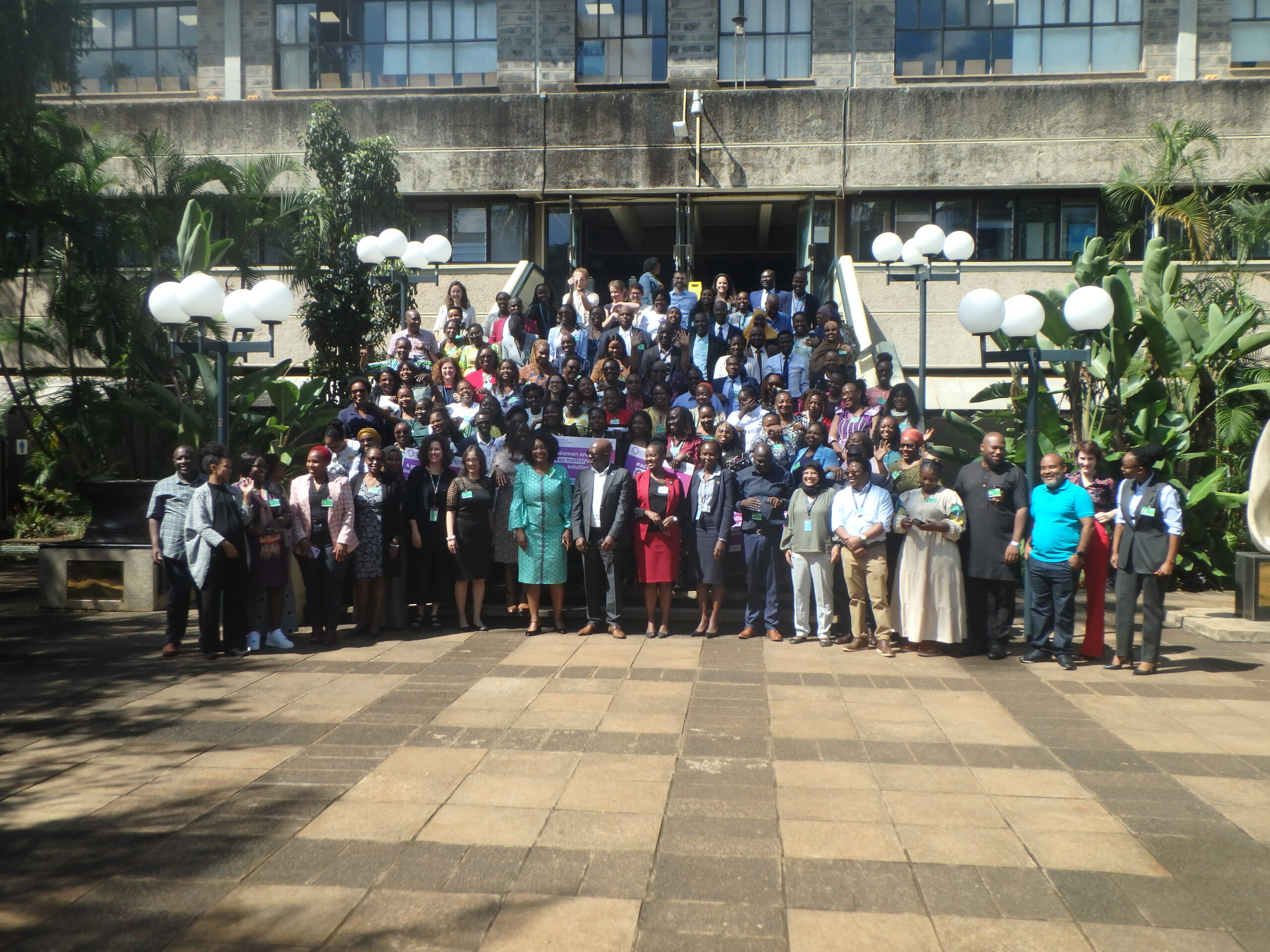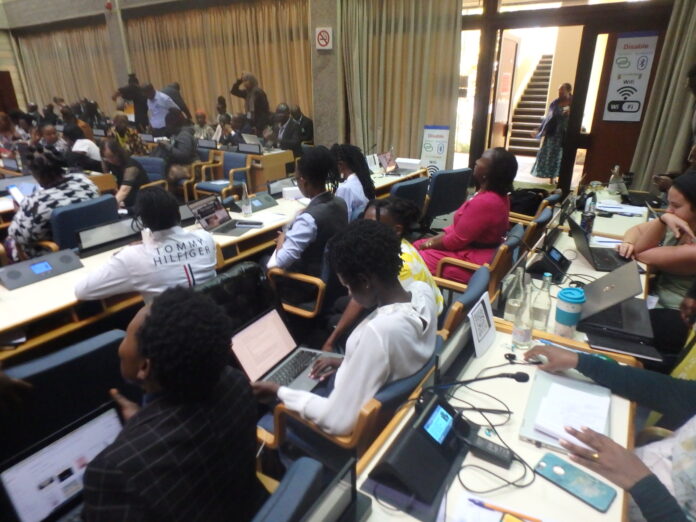By Henry Owino
Nairobi, Kenya: Women from across Africa are demanding gender inclusivity in any climate action discussions around the globe. Led by gender equality advocates, the women want their involvement in decision-making forums on climate issues as they are the most vulnerable group.
The African women maintained as much as two genders’ representations must be involved in the development and implementation of gender-responsive climate policies, women are affected differently hence the need for their voices. This they say as impacts of climate change continue to ravage sectors critical for women and girls.
For instance, the sectors including; water, agriculture, energy, health, finance, housing & infrastructure, and democracy & governance pose a unique threat to their livelihoods, well-being, and safety. Women’s agenda is never taken into serious consideration despite the gender agenda being a stand-alone programme specifically to address women and girls’ issues.
It is for this reason that gender equality advocates organized a three-day workshop in mid-April, 2024 at the UNEP headquarters in Nairobi, Kenya to outline the most pressing concerns. The workshop was themed; “Equality in Climate Action: Planning for a Gender Inclusive Future in Africa.”

At least there was representation of two delegates from each of the African countries either from government or civil society organizations.
The concerns raised were strategies that would ensure women meaningfully participate in decision-making levels around climate change. The gender advocates also emphasized the need to have women and men represented equally in United Nations Framework Convention on Climate Change (UNFCCC) processes.
Ann Wang’ombe, Principal Secretary, of the State Department of Gender and Affirmative Action in Kenya’s Government was the Chief Guest. She pointed out that women are mostly affected by the impacts of climate change in three interconnected ways.
The effects of health risks, and threats to economic opportunities added to household responsibilities which include caring for the family.
“In Sub-Saharan Africa, women contribute approximately 80 percent of the agriculture labour force. Owing to this, women are more vulnerable to climate shocks’ impact on food production. Additionally, women often have unequal ownership of land, which is a key natural resource to proper water access and other natural resources thus hampering them economically,” Wang’ombe explained.
“Again, it is estimated that women in Sub-Saharan Africa spend 40 billion hours a year collecting water. This not only reduces time spent in developing adaptation strategies but also often exposes women to risks such as violent attacks and sexual harassment. It therefore threatens their economic opportunities and increases household responsibilities,” she emphasized.
Wang;ombe regretted that labour markets across Africa are also heavily gender-segregated and many women occupy low-paying and insecure jobs. It is a burden most African women bear beside the climate change effects worsening situation.
“Women carry disproportionate unpaid work burden in our societies and rely more on natural resources and climate-sensitive sectors for their livelihoods. Gender inequality, thus, causes more women to be; poorer, less educated, greatly exposed to health risks, and makes them vulnerable to climate changes,” PS Gender and Affirmative Action,” stated.
Wang’ombe was disappointed that despite women being social agents, they are still being left out in climate action crucial discussions and in decision-making high-level meetings. She challenged gender advocates to take advantage of the stand-alone gender workshop and outline a clear roadmap of their pressing agenda.
For instance, the PS Gender and Affirmative Action cited that this year’s data by Women’s Environment & Development Organization (WEDO), shows only 34 percent of women participated in COP28. The 2023 United Nations Climate Change Conference or Conference of the Parties (UN COP 28) of the UNFCCC, more commonly known as COP28, was the 28th United Nations Climate Change Conference, held from 30 November to 13 December at Expo City, Dubai, United Arab Emirates.
This year’s COP 29 will convene from 11 to 22 November 2024 in Baku, Azerbaijan and many are expected to attend to voice and advance gender issues for climate justice, especially among African women. Larger representation with clear issues tabled before decision-making organs usually stands a high chances of consideration and subsequently climate change financing.
“Women and girls’ underrepresentation in advancing climate justice is low in all spheres of governance and decision making hence poor climate change governance,” Wang’ombe disclosed.
Winifred Masiko, Uganda’s Focal Point on Gender and Climate Change to the UNFCCC, said there is a need to mainstream gender in the development and review of nationally determined contributions, national action plans, and long-term strategies. She said gender and climate change negotiators must be supported through capacity building and participation in regional and international meetings.
“We must ensure equal representation and participation of women and girls in climate decision-making at all levels; integrating gender equality and women’s empowerment into all aspects of climate negotiations; and providing adequate funding for gender-responsive climate action,” Masiko explained.
Masiko emphasized there is a need to provide technical and financial support for the development, domestication, and implementation of national gender action plans.
UNDP Kenya Environment and Resilience team lead Evelyn Koech said the confluence of gender and climate change in Kenya presents a significant challenge for women. She clarified it is so because women bear a disproportionate burden exacerbated by existing gender inequalities.
“Its socio-economic fabric, largely dependent on climate-sensitive sectors, underscores the cruciality of addressing climate change impacts,” she said.
Koech revealed women in Kenya are integral to the agricultural sector, comprising approximately 75 percent of the agricultural labour force in small-scale agriculture. Notwithstanding their significant contributions, women face numerous barriers, including limited access to land, financial resources, and decision-making processes.
“In fact, only around 10 percent of land titles are issued to women and a similar fraction of agricultural credit goes to them. This disparity not only undermines women’s economic empowerment but also their capacity to adapt to climate-related adversities,” Koech said.
Koech added the involvement of women in adaptation and mitigation strategies is crucial for the development of sustainable and inclusive solutions. She further said societal norms and unequal access to resources and information limit their participation.
“Addressing the gendered impacts of climate change in Kenya involves a comprehensive approach that includes enhancing women’s access to land and resources, promoting gender equity in agricultural productivity, and ensuring women’s participation in climate change decision-making processes,” Koech affirmed.
She emphasized that capacity-building initiatives are crucial to empower women with the knowledge and skills necessary for climate resilience. Again, ensuring equitable access to climate finance enables women to engage in climate-resilient agricultural practices and access technologies that mitigate their workload and enhance productivity.














